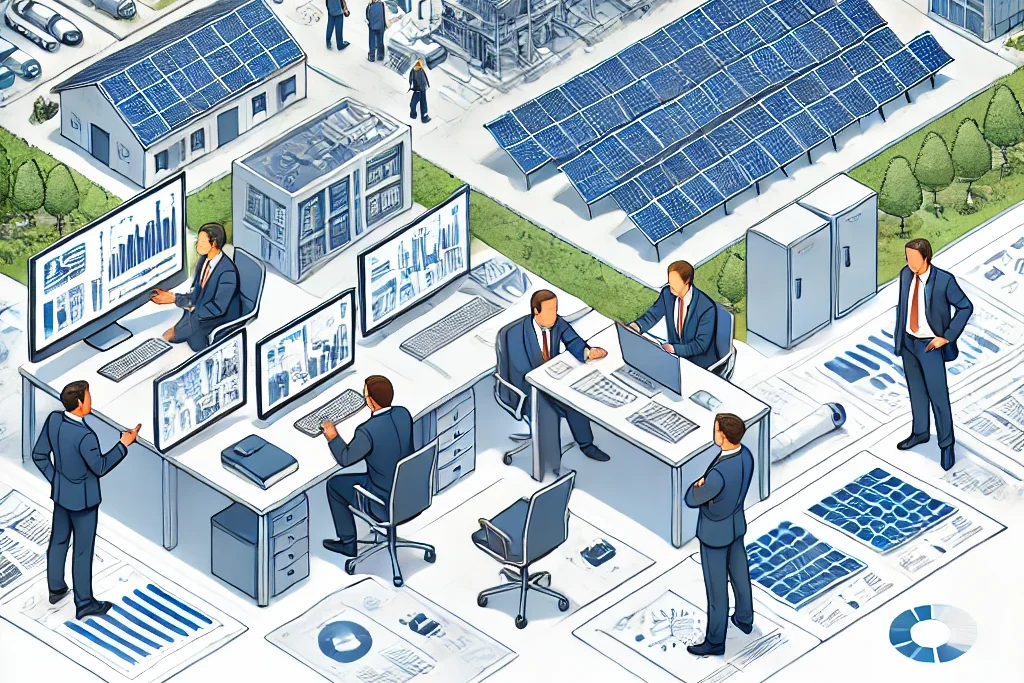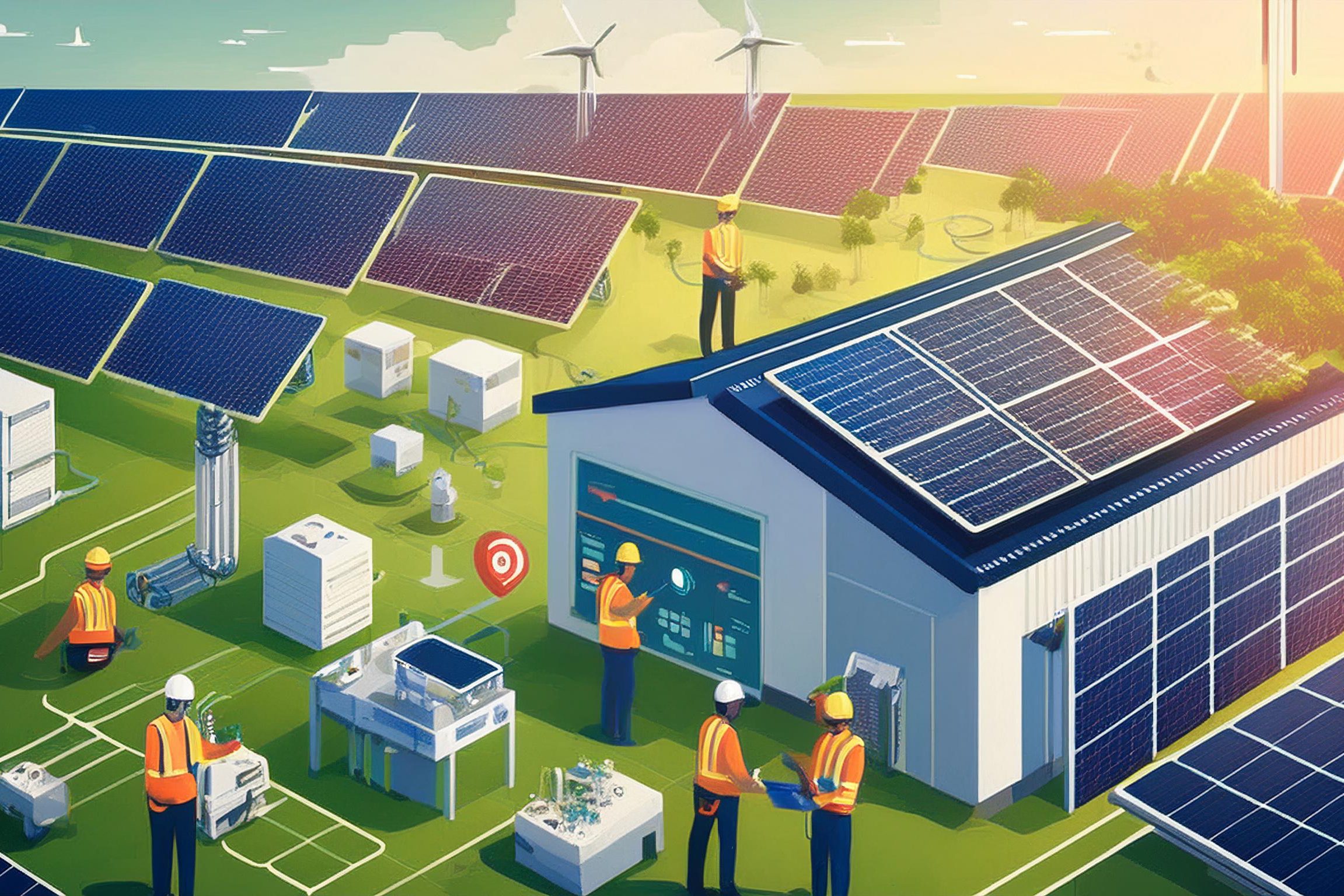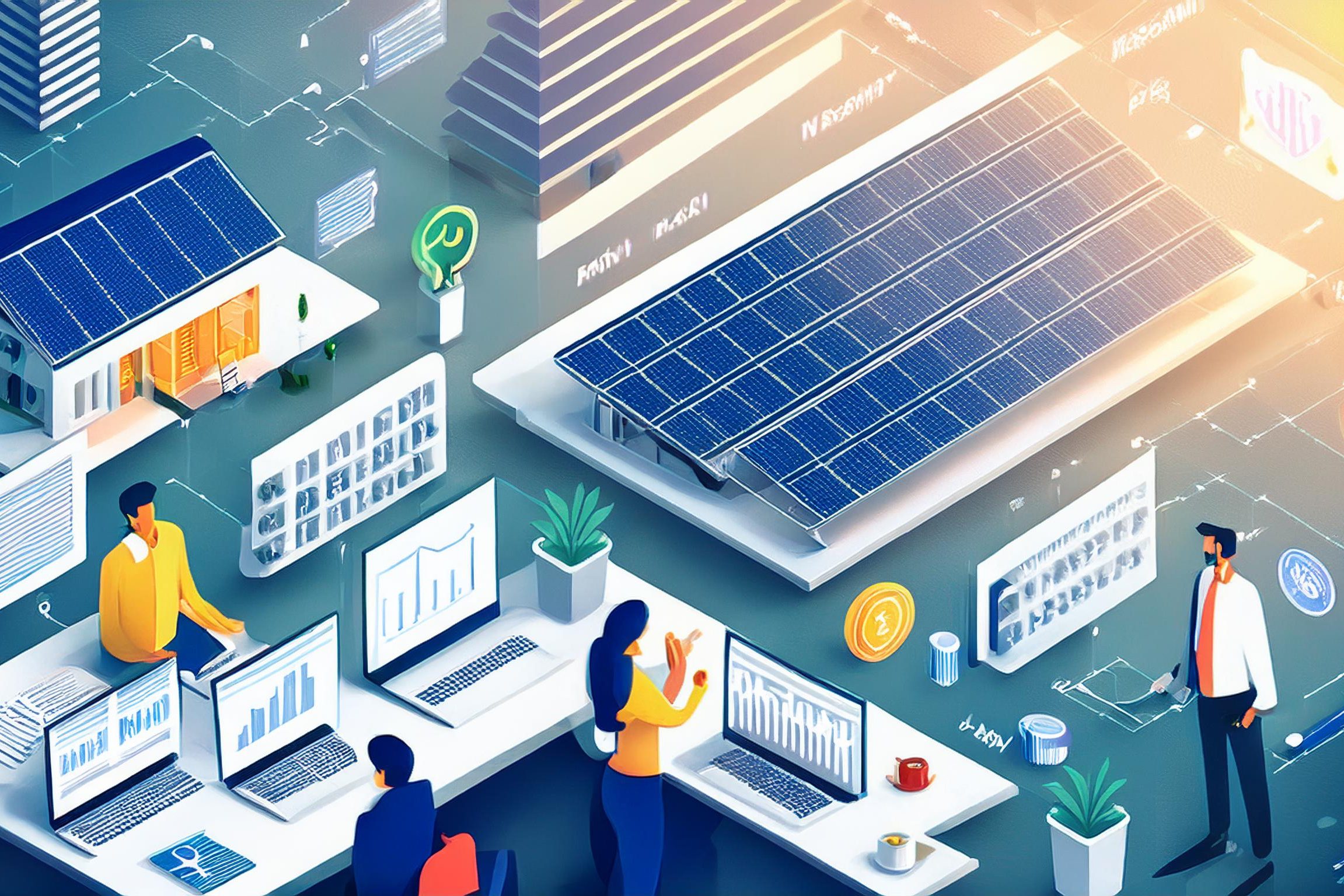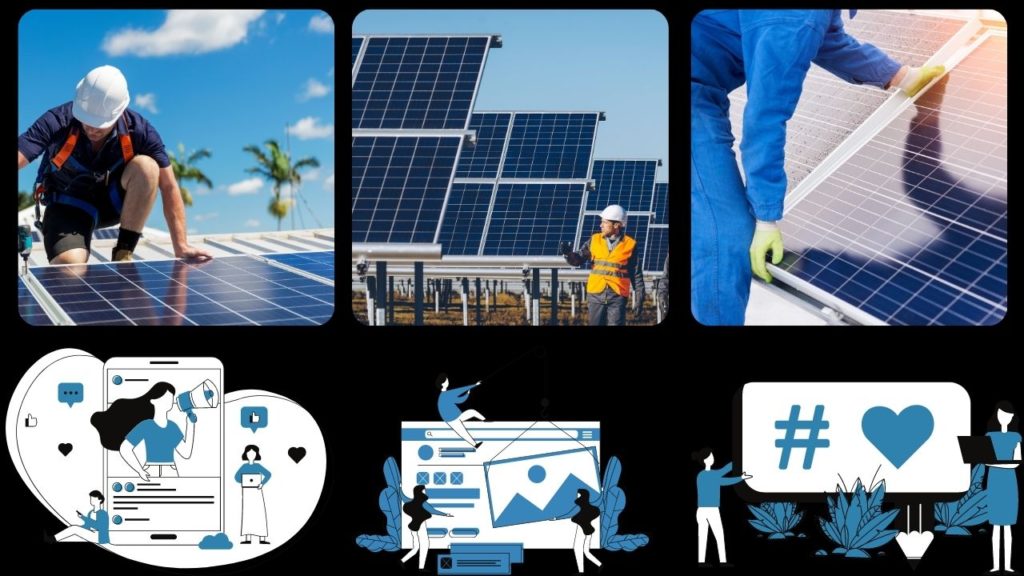EPC ?
In the renewable energy industry, an EPC (Engineering, Procurement, and Construction) company offers a comprehensive, turnkey solution for developing projects like solar, wind, or hydroelectric systems. They handle everything from designing the energy systems (engineering) to sourcing equipment (procurement) and managing the on-site installation (construction). By overseeing the entire project lifecycle, an EPC ensures seamless execution, allowing clients to invest in renewable energy without the complexities of coordinating multiple contractors. This approach streamlines the process and ensures timely, cost-effective, and efficient project delivery.

In Solar Energy Industry
In the solar energy industry, an EPC company plays a vital role by streamlining the development of solar power projects from start to finish. Here’s why an EPC is important:
- Technical Expertise: Solar EPC companies specialize in the design and optimization of solar systems, ensuring the installation is tailored to maximize energy generation based on the site’s unique conditions like sunlight exposure and location.
- Simplified Process: By managing the entire project—engineering, procurement of solar panels and inverters, and construction—an EPC serves as a single point of contact, reducing the complexity and hassle for clients.
- Cost Savings: EPC companies leverage their industry connections to source high-quality solar equipment at competitive prices, ensuring a cost-effective solution without compromising on performance or reliability.
- Timely Project Delivery: With extensive experience in solar installations, EPC companies ensure projects are completed within set timelines, minimizing delays and allowing clients to start benefiting from solar energy sooner.
- Risk Management: EPC companies assume the responsibility for all aspects of the project, reducing risks related to delays, quality issues, and cost overruns, giving clients confidence that their solar energy system will perform efficiently for years.
In the solar energy sector, an EPC is crucial for delivering optimized, cost-effective, and reliable solar power solutions, allowing businesses and homeowners to adopt renewable energy with ease.
Structure of an Solar Energy EPC
The structure of a Solar Energy EPC (Engineering, Procurement, and Construction) company is designed to manage the entire lifecycle of solar power projects, from initial design to final installation and commissioning. The company’s departments work together to ensure the efficient delivery of solar projects, whether for residential, commercial, or utility-scale developments.
Here’s a typical structure of a Solar EPC company:
1. Engineering Department
- Design & Planning: Responsible for the technical design of the solar power system, including solar panel layouts, electrical system design, and load calculations. This department ensures that the system is optimized for energy generation and compliance with local regulations.
- Site Assessment & Feasibility Studies: Performs on-site evaluations to determine solar potential, site suitability, and environmental impact.
- Permitting & Compliance: Ensures that the project meets all local, state, and national regulations, including acquiring necessary permits.

2. Procurement Department
- Sourcing & Supply Chain Management: This team handles the procurement of solar panels, inverters, mounting systems, batteries (if needed), and other essential materials. They work with suppliers to ensure cost-effective and high-quality equipment.
- Vendor Management: Manages relationships with equipment suppliers and subcontractors to ensure timely delivery and adherence to project specifications.

3. Construction Department
- Project Management: Oversees the entire construction process, from initial site preparation to the installation of solar panels, electrical systems, and mounting structures. They ensure the project is completed on time and within budget.
- Installation Teams: Specialized technicians and contractors responsible for physically installing the solar panels, inverters, wiring, and other components on-site.
- Quality Assurance & Safety: Ensures that all installations are done to standard, and that safety protocols are strictly followed to protect workers and equipment.

4. Operations & Maintenance (O&M) Department
- System Monitoring: Provides ongoing monitoring of solar installations to ensure optimal performance and detect any issues in real time.
- Maintenance Services: Responsible for routine maintenance, cleaning, and repairs to keep the system running efficiently over its lifecycle.
- Warranty & Support: Manages warranties, addressing any defects in equipment or installation, and providing customer support for system operations.

5. Finance & Legal Department
- Cost Estimation & Budgeting: This team works on project costing, financing solutions, and budgeting, ensuring that the project stays within financial targets.
- Contract Management: Handles all legal agreements, including contracts with clients, suppliers, and subcontractors, ensuring compliance with all legal and regulatory requirements.
- Incentive & Subsidy Management: Helps clients access government subsidies, tax incentives, and other financial benefits related to solar energy projects.

6. Sales & Marketing Department
- Business Development: Focuses on acquiring new clients and expanding the company’s market reach, identifying new opportunities in residential, commercial, and utility sectors.
- Client Relations: Manages ongoing relationships with customers, ensuring clear communication and satisfaction from project inception to completion.
- Marketing & Branding: Promotes the company’s solar energy solutions, focusing on generating leads and creating brand awareness in the market.

7. Research & Development (R&D)
- Innovation in Technology: Focuses on improving solar energy solutions by researching new technologies, such as advanced PV panels, battery storage systems, and efficient inverters.
- Sustainability & Efficiency: Works on increasing the efficiency and environmental sustainability of solar installations, often exploring innovations in materials or design.

8. Human Resources (HR)
- Recruitment & Training: Ensures that the company has skilled staff, including engineers, technicians, and project managers. Provides ongoing training to keep employees up-to-date on industry trends and safety practices.
- Employee Management: Oversees employee welfare, payroll, and compliance with labor laws.
Overall Workflow in a Solar EPC:
- Project Inception: Sales and business development teams work to acquire projects.
- Site Assessment & Design: Engineering evaluates the site and designs the system.
- Procurement: Necessary equipment is sourced and purchased by the procurement team.
- Installation: The construction department executes the installation, with oversight by project management.
- Commissioning & Handover: Once the system is installed, it’s tested and handed over to the client.
- Ongoing Support: Operations & Maintenance ensures the system performs optimally throughout its lifecycle.
This structure ensures that every phase of the solar project is handled efficiently, from initial planning to long-term performance, with specialized departments working in coordination.
Need of EPCs in India
In India’s booming solar energy sector, EPC companies are essential for driving the transition to clean energy. They manage the entire solar project lifecycle, from design and material sourcing to installation, ensuring timely and cost-effective execution. With India’s complex regulatory environment and vast solar potential, EPCs streamline the process for homeowners, businesses, and large-scale developers, helping them benefit from government incentives while contributing to the nation’s renewable energy goals. By offering turnkey solutions, EPCs make solar power accessible, efficient, and reliable across India.
SomSolar Giants: Leading EPC Companies in India
Some well-known EPC companies in India’s solar energy sector include:
- Tata Power Solar Systems Ltd.
One of India’s largest and most established solar EPC companies, Tata Power Solar provides end-to-end solar solutions for residential, commercial, and industrial projects. It is a pioneer in solar power installations across the country, handling large-scale utility and rooftop solar projects. - Sterling and Wilson Solar Ltd.
A global EPC player headquartered in India, Sterling and Wilson Solar is a leading name in solar project development. They are known for handling utility-scale solar projects, with significant international presence and experience in executing large, complex installations. - Mahindra Susten
Part of the Mahindra Group, Mahindra Susten specializes in turnkey solar EPC services. They have developed a wide range of solar projects, including large utility-scale solar parks and commercial rooftop installations. They also focus on solar operations and maintenance (O&M) services. - L&T (Larsen & Toubro) Solar
L&T is a major infrastructure company in India, and its solar division provides comprehensive EPC solutions for solar power plants. L&T Solar is known for its ability to deliver complex projects, including mega solar parks, within set timelines. - Adani Solar (Adani Green Energy)
A key player in India’s renewable energy landscape, Adani Solar is involved in both manufacturing solar equipment and providing EPC services for large-scale solar projects. Their focus is on mega solar power plants, with many successful installations across India. - Waaree Energies Ltd.
Waaree is one of India’s leading solar PV module manufacturers and also provides complete EPC services. The company has worked on both utility-scale and rooftop solar projects and is known for its focus on quality and cost-efficiency. - Jakson Group
A diversified energy and infrastructure company, Jakson Group offers EPC services for solar power plants, including solar rooftops and off-grid solutions. They have a strong presence in the Indian market, with a portfolio of utility-scale and commercial projects. - Vikram Solar
Primarily known as a manufacturer of solar PV modules, Vikram Solar also provides EPC services for utility-scale solar installations and rooftop projects. The company has a global footprint and is recognized for its innovative approach to solar power development.
These companies play a significant role in driving India’s renewable energy goals by delivering efficient and reliable solar power installations across different scales and sectors.
Local EPC: Community-Focused Solar Solutions and Their Benefits
Local EPC Definition: A Local EPC (Engineering, Procurement, and Construction) company is a regionally-based firm that specializes in providing tailored solar energy solutions for residential and small commercial projects.
Benefits Over Well-Known Giants:
- Cost-Effective: Local EPCs typically offer more competitive pricing due to lower overhead costs.
- Personalized Service: They provide customized solutions and closer client relationships, ensuring projects meet specific needs.
- Faster Response Times: Local firms can quickly respond to inquiries and changes, leading to quicker project completion.
- Community Knowledge: They have a deep understanding of local regulations and incentives, facilitating smoother permitting processes.
- Focus on Small Projects: Local EPCs specialize in smaller installations, making them more adept at handling unique residential requirements.
Schreibe einen Kommentar